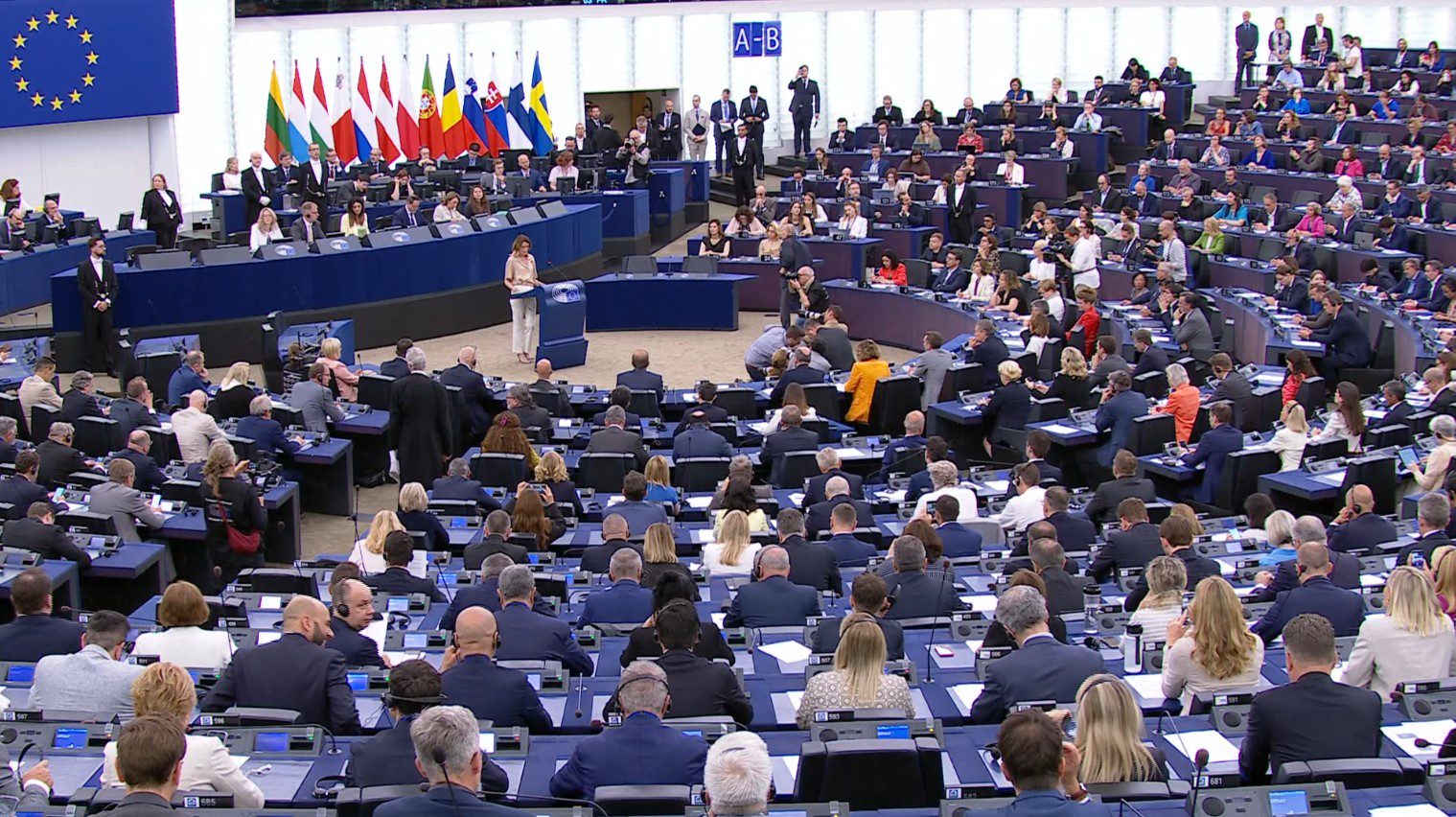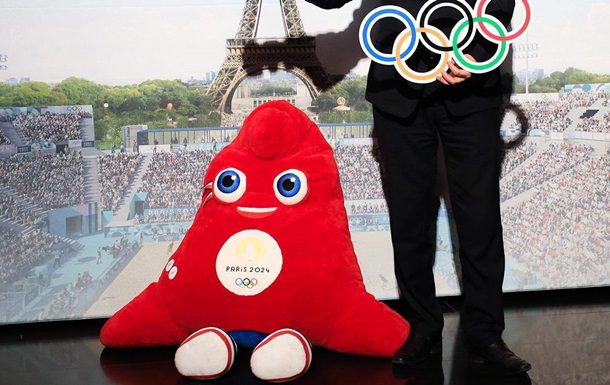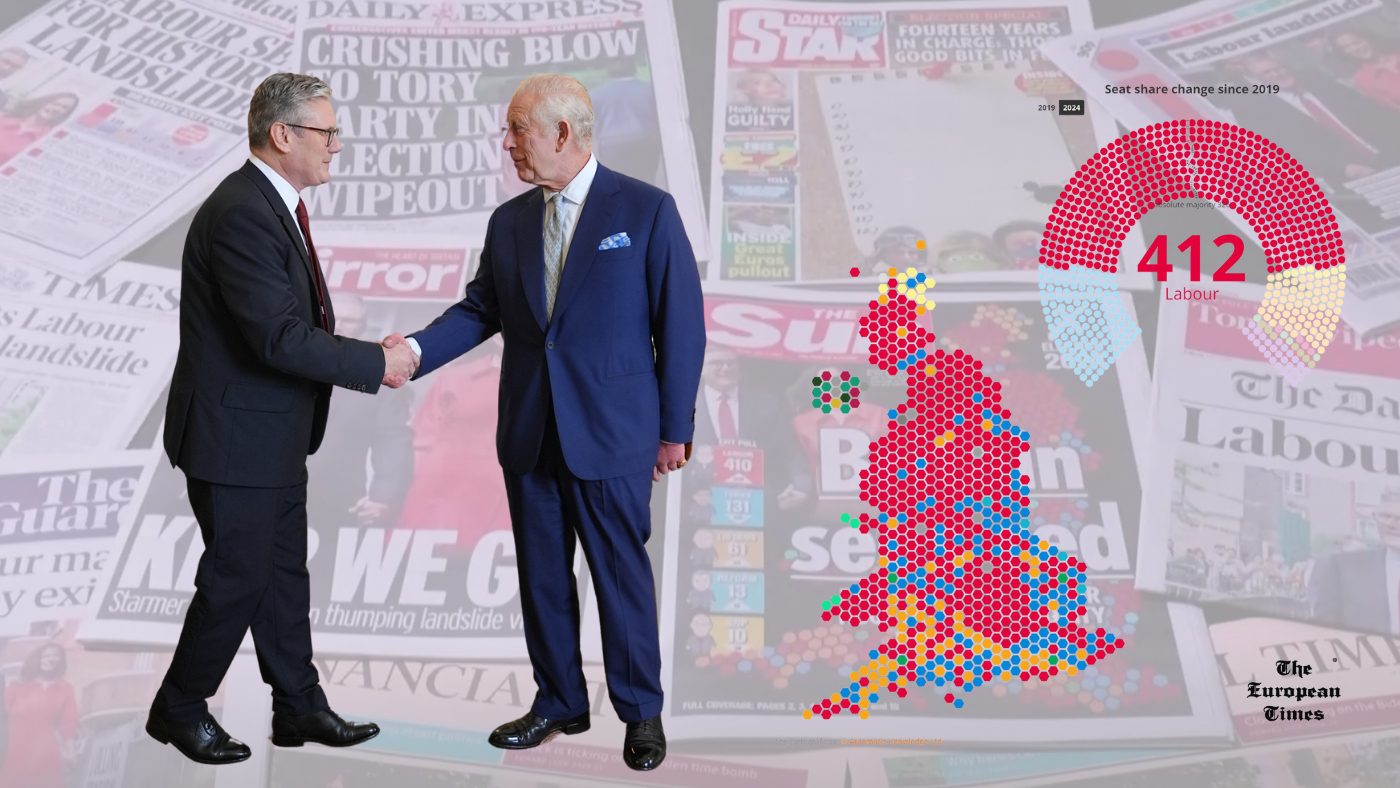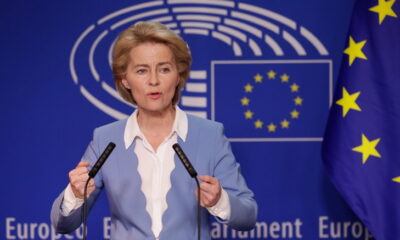Politics
Metsola at the European Council: This election will be the test of our systems | News
Addressing the Heads of State or Government at the March European Council in Brussels today, European Parliament President Roberta Metsola highlighted the following topics:
European Parliament elections:
“We are meeting today 77 days from the start of the European Parliament elections. We know how much we need to work together to get out the vote.
In this legislature, we have put Europe’s stamp on global geopolitics and we have defended our European way in an ever-changing world. We have become stronger because of the challenges we faced and not despite them. We have held the constructive European majority together and we must do that again.
Europe is delivering for our people, but we have to be able to get that message across every Member State. Together with MEPs, I have visited many countries to convince our people, especially our young people, to go out and vote.”
Disinformation:
“We know how far other actors will go to try to disrupt our democratic processes. We are seeing attempts in many States to push disinformation, misinformation and propaganda which come from actors hostile to the European project. It is a threat that we must be ready for.
We can make use of both legislative and non-legislative tools – particularly through how we tackle social media. Legislatively, we have the Digital Markets Act, Digital Services Act, the AI Act, political advertising and Media Freedom – but we must also be ready to engage better online.
We cannot allow this destructive narrative, propaganda and disinformation to spread without countering it. We have to be ready to engage with the platforms.
This election will be a test of our systems and makes our job of getting the message across even more essential.”
Addressing the citizens:
“My appeal here is to resist the temptation in a difficult campaign to blame Brussels for all that is wrong and give no credit where it is due.
We need to be open and honest about our successes – but also where we could have done better. Where we did not match the expectations of our people. Where people still feel left behind. Where our bureaucracy has pushed people away.
Our industry must be part of the equation. Our farmers have to be a part of the equation. Our young people must be part of the equation. People must have confidence in the process, they must have access to tools that allow them to make the shift and they must be able to afford it. Otherwise, it will not succeed.
The European Union is not perfect, but it is the best guarantee for all of our people. So where we need to fix – let us do so. But let us keep building rather than allow easy cynicism to destroy.
We can hand back a Europe that is stronger, that listens to its citizens, that works better, that is more efficient and effective. That – as Jean Claude Juncker famously put it – is big on the big things and small on the small things.”
Russia’s threat and support to Ukraine:
“There is nothing bigger than the threat posed to peace by Russia. We must continue to do everything within our power to help Ukraine to continue to defend itself.
We have already provided strong political, diplomatic, humanitarian, economic and military support to Ukraine, and here the European Parliament welcomes the adoption of the 13th package of sanctions, and the Ukraine Assistance Fund under the European Peace Facility.
In this critical moment, our support of Ukraine cannot waver. We need to speed-up and intensify the delivery of equipment that they need to sustain its defence.
We also have to help Ukraine by prolonging the Autonomous Trade Measures.”
European security:
“Our project of peace depends on our ability to be secure and autonomous. If we are serious about protecting our collective security we also need to take action on building a new EU security framework.
In shaping this new architecture, we have already found agreement on several issues that many thought impossible. Now we must be ready for the next step of cooperation between us all. In this new world, going alone will not work.”
Enlargement:
“Enlargement remains a priority. For Ukraine, for Moldova, for Georgia and for Bosnia and Herzegovina. For us all.
They all need to follow their own path and fulfil all the criteria required – but – with Ukraine in particular – their progress in meeting the milestones has been impressive.
In the last twelve months, Moldova and Bosnia and Herzegovina have also made remarkable progress in reforms. It is time to make good on our word. It is time to open EU accession negotiations with them and send a clear signal to people in the Western Balkans.
In this new geostrategic environment, an enlarged EU that is based on clear objectives, criteria and merit, will always serve as our best investment in peace, security, stability and prosperity.”
EU reform:
“We cannot lose sight of the fact that an enlarged EU will require change. Adaptation. Reform. The Parliament has made several proposals to this effect including those on the European Parliament’s right of inquiry, which has seen little movement over the past 12 years, and the triggering of the process for a European Convention.”
Economy:
“Enlargement will also help boost European competitiveness and improve the functioning of our single market. This must be a priority for the next legislature. That is how we grow our economies sustainably. How we pay our debts. How we create jobs and attract investment. How we ensure that growth works for everyone. It is with a strong economy that we can bring prosperity, security and stability. How we can reinforce Europe’s place in the world.”
Middle-East:
“A strong Europe has a role to play in the shifting sands of the world order – not least in the Middle East.
The humanitarian situation in Gaza is desperate. We need to use all the tools at our disposal to get more aid in. I welcome the Amalthea Initiative and would like to especially thank Cyprus for your leadership. Nonetheless, land distribution of aid remains the best avenue to deliver the volumes needed.
That is why the European Parliament will keep pushing for a ceasefire. Why we will keep demanding the return of the remaining hostages and why we underline that Hamas can no longer operate with impunity.
This is why we ask for clear conclusions on this today that will give direction going forward.
That is how we get more aid into Gaza, how we save innocent lives and how we push forward the urgent need for a two-state solution that gives real perspective to Palestinians and security to Israel.
A peace that empowers peaceful, legitimate, Palestinian leadership and that ensures lasting stability in the region.”
Situation in the Red Sea:
“This also concerns the situation in the Red Sea. I welcome the EUNAVFOR Aspides which will help protect this highly strategic maritime corridor. But there is more that we can do.
Across the Euro-Mediterranean, businesses are hugely impacted by delays, problems with warehousing and financial implications. We should consider an EU-led taskforce to assess how we can act together to mitigate the socio-economic consequences. There is a role for Europe to play here too.”
Conclusion:
“Let me assure you that the European Parliament will keep working until the last moment to deliver on the remaining legislative files, including on a new migration package.
Ultimately delivering on our priorities is our best tool to push back against disinformation and where citizens can see the difference that Europe makes.”
You can read the full speech here
Politics
European Parliament begins its 10th term

European Parliament Convenes in Strasbourg: New President to be Elected amid Growing Diversity
On a momentous Tuesday in Strasbourg, the European Parliament, following the recent European elections held on 6-9 June, officially commenced its proceedings. The session, presided over by the outgoing EP President, Roberta Metsola of the EPP from Malta, commenced with a musical interlude before Pina Picierno, the second Vice-President in the outgoing Parliament from Italy’s S&D, announced the contenders for the coveted Presidency of the Parliament.
The highly anticipated vote, conducted through a secret paper ballot, is set to occur immediately after the inaugural session. To ensure a fair process, eight MEPs, selected by lot, will oversee the election proceedings.
The distinguished candidates vying for the Presidency are Roberta Metsola representing EPP from Malta and Irene Montero from The Left in Spain. Ahead of the crucial vote, both candidates delivered succinct statements to the plenary, outlining their visions for the future of the European Parliament.
To attain victory, a candidate must secure an absolute majority of valid votes cast, which equates to 50% plus one. In the event of no clear winner in the initial round of voting, subsequent rounds may follow with the possibility of new or existing candidates being nominated under the same stipulations. If needed, a third round could ensue with the same regulations. Should no candidate emerge victorious after the third round, the two candidates with the highest votes in this round will advance to a decisive fourth and final round, with the majority winner emerging triumphant.
Upon the election of the new President, the distinguished individual will assume the leadership position and deliver a notable opening address, setting the tone for the parliamentary term ahead.
In this landmark tenth term, the European Parliament boasts 720 seats, an increase of 15 from the previous legislature. Notably, 54% of MEPs are fresh faces, marking a slight decrease from the 2019 intake of 61%, with the representation of women comprising 39%, down marginally from the 40% mark in 2019.
Among the diverse MEP cohort, Lena Schilling, a 23-year-old from Austria representing Greens/EFA, stands as the youngest member, while the seasoned Leoluca Orlando from Italy, a Green/EFA representative aged 77, holds the distinction of the oldest MEP. The average age of MEPs stands at 50, reflecting a diverse range of experiences and perspectives within the parliamentary body.
As the tenth term commences, the European Parliament encompasses eight political groups, an increase from the previous session. Additionally, 32 MEPs remain non-attached, underscoring the dynamic landscape of political affiliations within the Parliament and highlighting the vibrant tapestry of representation in the European legislative body.
Politics
For the first time in 40 years, the Olympics will not be broadcast in Russia

Not a single TV channel, streaming platform or cinema in Russia will show the competitions from the Summer Olympics in Paris, which begin on July 26, sports.ru writes. This happened for the first time in 40 years, when in 1984 the USSR boycotted the Olympics in Los Angeles.
The official explanation is that this time only 16 athletes will participate under a neutral flag, without an anthem and in “unpopular sports”. The unofficial thing is that this is a purely political decision of the Kremlin, and heads of federations call those who agreed to participate traitors, homeless people and foreign agents.
Paris Mayor on Russians at the 2024 Olympics: It would be better if they didn’t come
Anne Hidalgo condemned the International Olympic Committee’s decision regarding representatives of the aggressor country, she said already in March.
According to the official, it would be good if athletes from the terrorist country did not participate in international competitions.
“I prefer that they not come. We cannot act as if the invasion does not exist. We cannot act as if Putin is not a dictator who is threatening all of Europe today.”
At the same time, she added that such sanctions cannot be imposed against Israeli athletes, since Israel’s actions are different from Russia’s aggression.
“There can be no talk of imposing sanctions against Israel in connection with the Olympic and Paralympic Games. Because Israel is a democratic country,” the mayor told Reuters.
Photo: Social Network / korrespondent.net.
Politics
Keir Starmer Secures Historic Labour Victory, Ending 14 Years of Conservative Rule in UK

London – In a seismic shift in British politics, the Labour Party, led by Keir Starmer, has achieved a resounding victory in the UK general election, bringing an end to 14 years of Conservative governance. The results, which had been foreshadowed by months of polling, have given Labour its strongest parliamentary majority since 2001.
Labour secured an impressive 412 seats, far surpassing the 326 required for an absolute majority and more than doubling their 2019 performance. This landslide victory marks a dramatic turnaround for the party and signals a clear desire for change among the British electorate.
Upon learning of his victory in his central London constituency, Starmer declared, “The people have spoken, and they are ready for change.” This statement encapsulates the mood of a nation seemingly eager to embark on a new political chapter.

The Conservative Party, in stark contrast, suffered its worst defeat since its founding in 1834. The Tories lost at least 250 seats compared to their 2019 performance under Boris Johnson, ending up with a mere 121 seats. This historic collapse prompted the outgoing Prime Minister, Rishi Sunak, to apologize to “those Conservatives who have lost despite their dedication” while congratulating Starmer on his victory.
The election also saw significant shifts for other parties. The Liberal Democrats, led by Ed Davey, emerged as the third-largest party with 71 seats, a gain of 63 from the previous election. The Scottish National Party (SNP) experienced a dramatic decline, securing only nine seats, a loss of 38 compared to 2019. Sinn Fein, the Irish republican party, maintained its seven seats.

In a surprising development, the nationalist-populist Reform UK, led by Nigel Farage, entered Parliament with four seats, exceeding all poll predictions. The Green Party quadrupled its representation, winning four seats in total.
Starmer’s first address as Prime Minister was filled with promises of change and renewal. “We did it!” he exclaimed, emphasizing that Britons would wake up to find “a weight has finally been lifted from the shoulders of this great nation.” He stressed the urgency of rebuilding trust in politics and committed to serving all citizens, regardless of their voting preferences.
The new Prime Minister outlined his government’s priorities, including improving security on streets and borders, rebuilding infrastructure, and enhancing opportunities in education and employment. “Changing a country isn’t as easy as pressing a button,” Starmer cautioned, “We will rebuild the United Kingdom, brick by brick.”
Rishi Sunak, in his farewell speech, acknowledged the clear signal for change sent by the electorate. “I have heard your anger and disappointment. I take responsibility for these results,” he stated. Sunak announced his intention to step down as Conservative Party leader, but not immediately, allowing time for a formal process to choose his successor.
The election also marked a personal triumph for Nigel Farage, who finally won a parliamentary seat on his eighth attempt, representing Clacton-on-Sea. Farage hailed his party’s performance as “extraordinary” and vowed to fill what he sees as a “huge void in the center-right.”
In regional developments, Sinn Fein became the largest Northern Irish party in the British Parliament for the first time, maintaining its seven seats while the Democratic Unionist Party (DUP) fell to four. In Scotland, the SNP lost its dominance, dropping from 48 seats in 2019 to just 8, with Labour making significant gains. Wales saw the Conservatives lose all representation, with Labour dominating the results.
As the United Kingdom enters this new political era under Starmer’s leadership, the country faces significant challenges. The incoming government must address economic concerns, social policies, and perhaps most critically, work to restore public trust in the political system. The scale of Labour’s victory suggests a strong mandate for change, but the real test lies in translating this electoral success into effective governance in the years to come.
-

 Sports7 days ago
Sports7 days agoOfficial: Juventus announces sixth purchase
-

 Health & Society7 days ago
Health & Society7 days agoThe intoxicated society
-

 Politics5 days ago
Politics5 days agoThe Russian patriarch to Putin: You are the first truly Orthodox president
-

 Sports6 days ago
Sports6 days agoBeautiful Juve: Vlahovic and youth rout Verona. Thiago Motta first
-

 Sports6 days ago
Sports6 days agoJuventus, Vlahovic: “Now we play a different game.”
-

 Politics3 days ago
Politics3 days agoEU Intensifies Pressure: Six-Month Extension of Russia Sanctions
-

 Health & Society2 days ago
Health & Society2 days ago7 Superfoods That Will Boost Your Fitness Results
-

 Politics2 days ago
Politics2 days agoStatement by President von der Leyen at the joint press conference with President Metsola following the European Parliament Plenary vote








